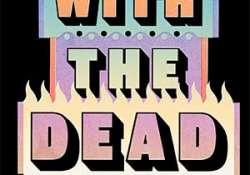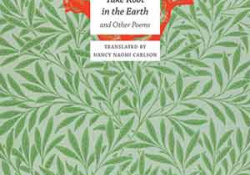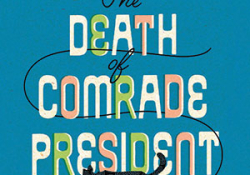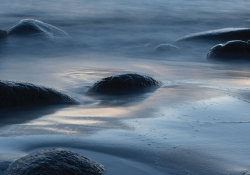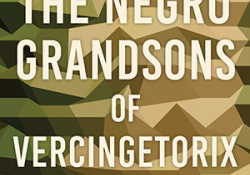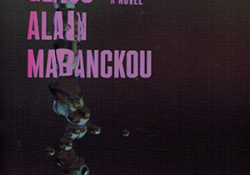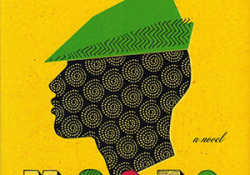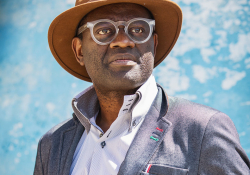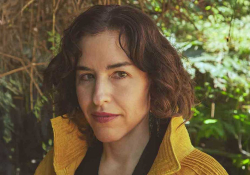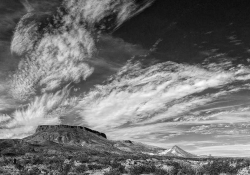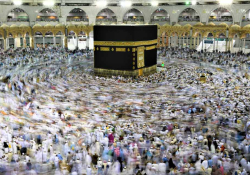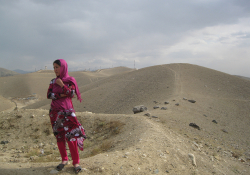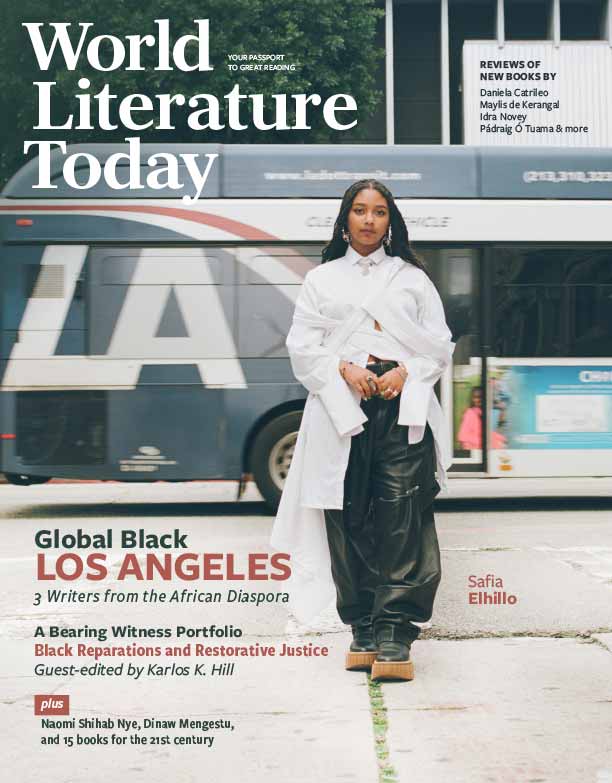My America: Between Fantasy and Reality

In his recent essay collection Rumeurs d’Amérique (2020), Congolese-born writer Alain Mabanckou surveys LA from the balcony of his apartment while also looking east to the United States, France, the DRC, and beyond. During his flâneries of the cityscape, he also revels in the multilingual voices of Angelenos who cross his path: a Korean tutor at Starbucks, a Hebrew-speaking locksmith, a down-on-his-luck Senegalese immigrant. “My America” is the opening essay in the collection.
I moved to downtown LA almost a year ago, and I enjoy writing here, on my balcony, where I’ve created a tropical atmosphere with lots of plants in colorful pots.
This is my habit now. First thing in the morning, with a mug of Triple Leaf tea in one hand and a spiral notebook in the other, I go to my perch to scribble for as long as my college teaching schedule will allow. The narrow space can hardly fit two or three people. But I’ve arranged it with special attention and an exaggerated sense of detail, which my friends make fun of.
This morning, looking at my notebook, I dare to open wide the doors to my America for the first time. Up until now, most of my books have dealt with my homeland, Congo-Brazzaville, or relations between France and Africa, except for a few essays, such as Letter to Jimmy, about the African American writer James Baldwin, or The Tears of the Black Man, which was partly about relations between Africans and African Americans.
So perhaps I should say that my books occupy the geography imposed by my migrations between Africa, Europe, and now America. Each of these areas appears during the day but melds into others at nightfall, creating my identity as a person in flux, encountering the Other.
Without getting distracted by the plane flying very low in the sky over my new neighborhood, Mid-Wilshire, I take stock of the time that has passed. It took me fifteen years or so to finally focus my attention on someplace other than my homeland, Congo, or my adoptive country, France. I can only explain this procrastination by the need to avoid forcing things, to wait for them to ripen, so that they naturally connect with my creative world when the time is right.
By writing about America, I’m still not abandoning Congo-Brazzaville, which I lug around day and night like the tortoise Kalala, who carries his shell without feeling its weight, being careful to protect it from wind and water because it is his ultimate home. Nor have I ditched France, where I lived for seventeen years—almost as long as I lived in Congo—and where I have unbreakable bonds.

By writing about America, I’m still not abandoning Congo-Brazzaville, which I lug around day and night like the tortoise Kalala, who carries his shell without feeling its weight.
I’ve even accepted the ungrateful task of justifying myself to certain Americans who ask me why I write in French when it is not the language of my home continent. Though, in fact, this lesson is not really so hard, for, as soon as I say the word “colonization,” the Americans’ faces light up with curiosity, especially when I explain that, decades later, debates regarding the consequences and the history of colonialism are still ongoing in France.
But it doesn’t matter—in America, I’m an African. And I’m also aware of the clouds that hover over my relations with African Americans. I’ve heard here and there that some African Americans accuse us Africans of having colluded with the slave ships that deported their ancestors, eternally marking us as traitors.
Of course, these controversies have their place in our era, but I’ll say it loud and clear: my debt to the African American world goes far beyond what I get out of these confrontational, preachy encounters. I’m grateful to writers and activists. With power and intelligence, they shaped the face of Black America as transfigured by the struggle for civil rights.
Their names are Harriet Tubman, Frederick Douglass, W. E. B. Du Bois, Octavia E. Butler, Rosa Parks, Langston Hughes, Richard Wright, Marcus Garvey, Ralph Ellison, Zora Neale Hurston, Chester Himes, Martin Luther King Jr., Malcolm X, James Baldwin, Toni Morrison, and Maya Angelou. They have refueled my pride. They have glorified and elevated the continent from which their ancestors were dragged away in one of the most tragic episodes of History.
Nor am I unaware of the white people who lost their lives by revealing our condition to the world. I’m thinking, for instance, of the French journalist Paul Guihard, who was murdered on September 30, 1962 while he was covering a historic event: the American Supreme Court had upheld the right of a Black American, James Meredith, to attend the University of Mississippi.
And what about Juliette Hampton Morgan, who lived in Alabama, the nerve center of the struggle against segregation. This librarian decided to ignore her privileges as a white woman in order to embrace the cause of Black Americans, and she played a decisive role. She did not hesitate to write letters in the local press supporting Rosa Parks, who was herself a heroic figure, refusing to give up her seat on a Montgomery bus to a white person. This act of non-violence would have a ripple effect resulting in the March on Washington for Jobs and Freedom on August 28, 1963, led by Reverend Martin Luther King, Jr. There he gave his famous “I Have a Dream” speech to an audience of over 250,000 people.
I could also counter divisive opinions by pointing out how Black Americans inspired the Negritude movement in Africa. In the 1930s, this literary, political, and artistic movement celebrated African civilizations and led to the independence of African nations. This is a legacy that we preserve and renew, each in our own way, wherever we may be, because the world now requires new interpretive frameworks.
Basically, when I hear about Africans’ complicity in slavery, instead of arguing, I prefer to reread one of the illustrious African American intellectuals who are closest to us: LeRoi Jones, known as Amiri Baraka, who died in 2014.
Baraka identified another kind of complicity. He saw that part of his own community was inclined to erase its color in order to preserve its socio-economic interests. In Blues People: Negro Music in White America, he did not mince words: “It was the growing black middle class who believed that the best way to survive in America would be to disappear completely, leaving no trace at all that there had ever been an Africa, or a slavery, or even, finally, a black man.”
And because I refuse to be confined under house arrest, I’ll add that my America is not limited to the way it is described by Black American writers and activists. I don’t read American authors only after checking the pigmentation of their skin or with an urge to filter my vision of the world through a single color.

I don’t read American authors only after checking the pigmentation of their skin or with an urge to filter my vision of the world through a single color.
When I attended Lycée Karl-Marx in Pointe-Noire, I thought that the author of The Sound and the Fury, William Faulkner, was Black. I didn’t think to look for a photo of the writer, nor did I really care—I was moved by his world, his social vision of the American South, which was a topic of conversation with my father, Papa Roger, and most of all I felt in my flesh the dizzying movement of his style.
I searched encyclopedias tirelessly for the fictional Yoknapatawpha County, this “postage stamp” with infinite dimensions, located somewhere in Mississippi. When I came to the US, I even went to Lafayette County, which they say inspired Faulkner when he created his fictional world. I came back empty-handed and ended my stay in New Orleans, listening to jazz at the Blue Nile on Frenchman Street.
Also in high school, I followed Ishmael onto the high seas, getting on board Captain Ahab’s whaling ship Pequod. Moby-Dick blew me away, thanks to a writer of Dutch and Scottish heritage, Herman Melville, and the irresistible brilliance of his narration.
In the library of the French Cultural Center in Pointe-Noire (the ancestor of the French Institute), I felt at home. Sometimes the manager would catch me at closing time staring at a photo of Mark Twain and his bushy moustache. I was still unaware of Ernest Hemingway’s statement that all modern American literature comes from Huckleberry Finn, and I unreservedly share this opinion now that I have reread it in English.
It was thanks to John Steinbeck’s Of Mice and Men that I understood what friendship could mean. With Flannery O’Connor—that gifted, gloomy child of the South, whose stories are full of the spinelessness of poor whites, their violence, and their sordid crimes—I was finally convinced that places ravaged by conflict give rise to the greatest writers. What about the fearlessness of Vladimir Nabokov, switching from Russian to English? Recently, the American novelist, short-story writer, and essayist Jhumpa Lahiri moved to Italy and decided to stop writing in English in order to learn Italian, thus abandoning the language that made her career in the English-speaking world. What could be a bolder act for a writer?
My America is a land where the exiled became the standard-bearers of the nation and its pride. Hungarian journalist Joseph Pulitzer, who gave his name to the country’s most prestigious literary award; the German Levi-Strauss, who dressed the whole world in blue jeans of his invention; Albert Einstein, the roaming physicist who was in turn stateless, Italian, Swiss, Austrian, Belgian, and American. A land where Africans could be proud of the career of Dikembe Mutombo, a basketball player born in Zaïre (Democratic Republic of the Congo). Former secretary of state Madeleine Albright was from the former Czechoslovakia. Designer Oscar de la Renta hailed from the Dominican Republic. Arianna Huffington, who founded the Huffington Post and is considered one of the 100 most influential people in the world, has roots in Greece.
My America is Hollywood overflowing with the descendants of immigrants who delight audiences and make hits for studios: Pamela Anderson and Jim Carrey (Canada), Natalie Portman (Israel), Nicole Kidman (Australia), Charlize Theron (South Africa), Arnold Schwarzenegger (Austria), Djimon Hounsou (Benin), Lupita Nyong’o (Kenya), Chiwetel Ejiofor (Nigeria), Chipo Chung (Tanzania), not counting the great “Italian wave” of influential actors and producers, including Martin Scorsese, Sofia Coppola, Francis Ford Coppola, Al Pacino, Quentin Tarantino, Robert De Niro, Sean Penn, Joe Pesci, Brian De Palma, Susan Sarandon, Jennifer Aniston, Bradley Cooper, Sylvester Stallone, Vin Diesel, and John Travolta.
When I scan the shelves of my library, tracing the peregrinations and places of exile of writers I admire, such as Irish writer James Joyce (Switzerland), Argentinian writer Jorge Luis Borges (Switzerland), or the Germans Thomas Mann (Italy, Switzerland, the US) and Bertolt Brecht (Scandinavia and the US), I tell myself that much of modern literature was written by individuals who, for reasons of politics, language, or simply for peace of mind, chose to settle outside the borders of their home countries. And I am doing the same.
I belong, of course, to the generation of African writers who immigrated to France in the 1990s. But I now feel close to creative voices from all over the world for whom the United States is a springboard: Azar Nafisi (Iran), Chimamanda Ngozie Adichie (Nigeria), Khaled Hosseini (Afghanistan), Ha Jin (China), Art Spiegelman (Sweden, with parents from Poland), or Cristina García (Cuba).
Yes, I’m writing about “my America” from my California balcony, and it has a long view, all the way to the bars in the Marx-Dormoy neighborhood of Paris or to my mother’s wooden house in the Voungou neighborhood in Pointe-Noire.
I’m writing about “my America” from my California balcony, and it has a long view.
Here I blend into the crowd, feeling the pulse of those who are the same color as me and those who are different from me as I interact with them on a daily basis. Some places in California and Michigan whisper their stories to me because I know them intimately. Others resist, and occasionally I must dig a long time to finally see their true faces appear. But this journey has meaning only if it’s personal and subjective, somewhere between personal history and History with a capital H, between the immense and the miniscule. And maybe, without even realizing it, I’m writing what I could call my American autobiography, between the mirages of the imaginary, the surprising twists of the unexpected, the digressions of anecdotes, and the rawness of reality.
This is what my America is like.
Translation from the French
Editorial note: “Mon Amérique: entre imaginaire et réel,” from Rumeurs d’Amérique, copyright © 2020 by Éditions Plon. English-language translation copyright © 2025 by Kate Deimling. Published by arrangement with the French Publishers’ Agency.


